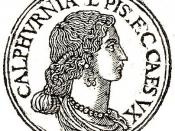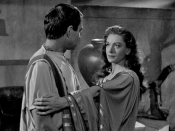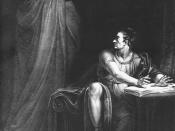The play Julius Caesar by William Shakespeare was written about the conspiracy against and murder of Julius Caesar. However, the themes and the scenes of the play seemed to revolve less around Julius and more around another of the play's main characters: Brutus, Caesar's friend.
Although Caesar is a major element in the plot, he's not the main focus of the play. When considering actual presence on stage, Caesar comes up lacking. His murder is in the third of five acts in the play. He does not appear in two acts, and his appearance in the other three is minimal; this is unusual for a main character. The plot also excludes Caesar from the play. In the story, Julius is the one being conspired against. He is completely oblivious to the idea that his friends may not all be his friends, and that they may not be content with him gaining power.
The conspiracy worked completely behind his back, meaning the story could, and did, work around him. One more aspect was that he was a pitiful character. He bragged about how he made his decisions wisely and could not be influenced one way or another. He was resolute about going to the city to be crowned king, however, when Calpurnia asked him to stay home he did. Then Caius Ligarius convinced Caesar to go. With the exception of that scene and his murder, all of his other appearances were simply to advance the plot, not to develop any character.
In contrast, many of the pivotal scenes of the play involve Brutus. His appearances in most of the play's scenes make it his play, rather than Caesar's. He plays a crucial role in many of the scenes, especially the important ones, like the murder and funeral. Some certain scenes are entirely about him, for example, his scene in which he debates whether he should join the conspiracy. His mental turmoil on how he deals with the idea of betraying his friend drives the plot. After joining the conspiracy he takes control of its actions. While Calpurnia just acts as another ignored warning to Caesar, Portia adds more to Brutus' character. A sense of marital difficulties presents itself, adding depth to Brutus' appearance. Brutus had a more complex personality, which developed further throughout the play. He started out as being naïve and idealistic, which later changed when he found out that not all the conspirators had the same motivations as he. Finally, we eventually se that Brutus is the tragic hero of the story. Caesar does not have a role like that: he is neither a hero nor a villain. Brutus comes to us as being a hero because of his motivations to kill Caesar. Unlike the other conspirators, who want Caesar dead out of jealousy, Brutus is concerned for Rome's welfare. Brutus toiled over whether Caesar was destined to become a tyrant, or if he would become a good ruler for Rome. Brutus became a tragic hero at the end of the play. He did what he thought, and very well could have been what, was right thing to do. In doing this, a war was started. Brutus and Cassius fought against Antony and Octavius Caesar, resulting in Brutus and Cassius losing the battle. The armies of Antony and Octavius were searching for Brutus to take him a prisoner. Knowing this, Brutus decided to kill himself and die with honor rather than being taken. This showed that Brutus' character was becoming more developed all the way to the end of the play.
The themes and story of the play all had Caesar in mind, but it was being portrayed through Brutus' point of view. Caesar's character was two-dimensional and unchanging. Brutus' character was complex, going through many changes throughout the five acts.





